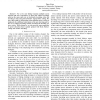36 search results - page 3 / 8 » Opportunistic power allocation for fading channels with non-... |
GLOBECOM
2006
IEEE
14 years 9 hour ago
2006
IEEE
— For a two user fading Gaussian multiple access channel with user cooperation, we show that window decoding achieves the same sum rate as backwards decoding, when the encoding i...
ICC
2009
IEEE
14 years 21 days ago
2009
IEEE
Abstract—This paper investigates Orthogonal FrequencyDivision Multiple-Access (OFDMA) resource-allocation schemes for two-hop relays in a home Powerline Communication (PLC) netwo...
CORR
2006
Springer
13 years 6 months ago
2006
Springer
For a fading Gaussian multiple access channel with user cooperation, we obtain the optimal power allocation policies that maximize the rates achievable by block Markov superpositi...
VTC
2007
IEEE
14 years 6 days ago
2007
IEEE
—This paper presents an opportunistic feedback (OF) protocol that achieves the asymptotic sum-capacity of the fading broadcast channel (BC) with a limited amount of feedback. The...
PIMRC
2008
IEEE
14 years 10 days ago
2008
IEEE
— We consider the problem of rate allocation in a fading Gaussian multiple-access channel with fixed transmission powers. The goal is to maximize a general concave utility funct...

